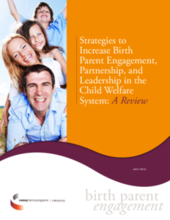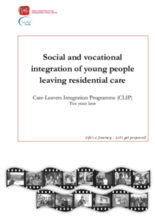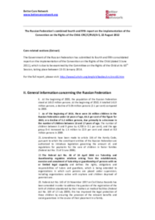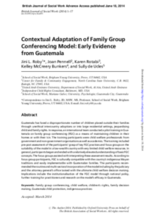Displaying 12951 - 12960 of 14579
This Declaration on Child Rights and Wellbeing was adopted by the Partner States of the East African Community (EAC) in Bujumbura on 3rd September 2012 during the First EAC Child Rights Conference under the theme, “Addressing the issues that negatively impact on the realisation of child rights in the EAC.”
As an outgrowth of Casey’s ongoing work with birth parents, Research Services and Technical Assistance Unit collaborated to review strategies and programs that increase birth parent engagement with child welfare services and that develop effective child welfare partnerships with birth parents as mentors, leaders and advisers.
The chapters in this book discuss the complexity immediately encountered when approaching the task of improving the lives of Looked After Children (LAC).
This paper evaluates a program started by International Social Service for social and professional realisation of young people leaving care (Care Leavers Integration Programme, CLIP), ten years after the program began.
This paper combines qualitative research with three micro data sets and finds that the presence of urban basic services is importantly linked to child residence of migrant parents.
This briefing note, produced by an Interagency Working Group on children without parental care, was designed to highlight the special vulnerability of children with disabilities who are in alternative care and to encourage members of the Convention on the Rights of Persons with Disabilities (CRPD) Committee to consider the potential added value of reference to the Guidelines for the Alternative Care of Children.
Care related sections of the Government of the Russian Federation's fourth and fifth combined report on the implementation of the Convention on the Rights of the Child (dated 3rd June 2011).
This article focuses on a central problem of foster care, which is that it is often not developmentally informed.
In this TED Talk, Daniela Papi - founder of PEPY, a Cambodian youth leadership organization, and PEPY Tours, a development education travel company - speaks of the ways that international volunteering can be harmful to children and communities and urges volunteers and organizations to rethink “voluntourism.”
Helping families and their kin develop care plans for orphaned and vulnerable children was the objective of the family group conferencing (FGC) training that took place in Guatemala City from July 10-12, 2012. This family preservation approach for developing strategies to prevent the institutionalization of children emphasizes the strengths of families and their capacity to solve their own problems and develop their own care plans.






